#pasifika
Text
while everyone's rightfully talking about oppenheimer and its flaws regarding the erasure of japanese and native american voices regarding nuclear testing and detonations, i'd like to bring up the fact that pacific islanders have also been severely impacted by nuclear testing under the pacific proving grounds, a name given by the US to a number of sites in the pacific that were designated for testing nuclear weapons after the second world war, at least 318 of which were dropped on our ancestral homes and people. i would like if more people talked about this.
important sections are bolded for ease of reading. i would appreciate this being reblogged since it's a bit alarming how few people know about this.
--
in 1946, the indigenous peoples of pikinni (the bikini atoll) were forcibly relocated off of their islands so that nuclear tests could be run on the atoll. at least 23 nuclear bombs were detonated on this inhabited island chain, including 20 hydrogen bombs. many pasifika were irreversibly irradiated, all of them were starved during multiple forced relocations, and the island chain is still unsafe to live on despite multiple cleanup attempts. there are several craters visible from space that were left on the atoll from nuclear testing.
the forced relocation was to several different small and previously uninhabited islands over several decades, none of which were able to sustain traditional lifestyles which directly lead to further starvation and loss of culture and identity. there is a reason that pacific islanders choose specific islands to inhabit including access to fresh water, food, shelter, cloth and fibre, climate, etc. and obviously none of these reasons were taken into account during the displacements.
200 pikinni were eventually moved back to the atoll in the 1970s but dangerous levels of strontium-90 were found in drinking water in 1978 and the inhabitants were found to have abnormally high levels of caesium-137 in their bodies.
--
i'm going to put the rest of this post under a readmore to improve the chances of this being reblogged by the general public. i would recommend you read the entirety of the post since it really isn't long and goes into detail about, say, entire islands being fully, utterly destroyed. like, wiped off of the map. without exaggeration, entire islands were disintegrated.
--
as i just mentioned, ānewetak (the eniwetok atoll) was bombed so violently that an entire island, āllokļap, was permanently and completely destroyed. an entire island. it's just GONE. the world's first hydrogen bomb was tested on this island. the crater is visibly larger than any of the islands next to it, more than a mile in diameter and roughly fifteen storeys deep. the hydrogen bomb released roughly 700 times the energy released during the bombing of hiroshima. this would, of course, be later outdone by other hydrogen bombs dropped on the pacific, reaching over 1000 times the energy released.
one attempt to clean up the waste on ānewetak was the construction of a large ~380ft dome, colloquially known as the tomb, on runit island. the island has been essentially turned into a nuclear waste dump where several other islands of ānewetak have moved irradiated soil to and, due to climate change, rising seawater is beginning to seep into the dome, causing nuclear waste to leak out. along with this, if a large typhoon were to hit the dome, there would be a catastrophic failure followed by a leak of nuclear waste into the surrounding land, drinking water, and ocean. the tomb was built haphazardly and quickly to cut costs.
hey, though, there's a plus side! the water in the lagoon and the soil surrounding the tomb is far more radioactive than the currently contained radioactive waste. a typhoon wouldn't cause (much) worse irradiation than the locals and ocean already currently experience, anyway! it's already gone to shit! and who cares, right, the only ""concern"" is that it will just further poison the drinking water of the locals with radioactive materials. this can just be handwaved off as a nonissue, i guess. /s
--
at least 36 bombs were detonated in the general vicinity of kiritimati (christmas island) and johnson atoll. while johnson atoll has seemingly never been inhabited by polynesians, kiritimati was used intermittently by polynesians (and later on, micronesians) for several hundred years. many islands in the pacific were inhabited seasonally and likewise many pacific islanders should be classified as nomadic but it has always been convenient for the goal of white supremacy and imperalism to claim that semi-inhabited areas are completely uninhabited, claimable pieces of terra nullius.
regardless of the current lack of inhabitants on these islands, the nuclear detonations have caused widespread ecological damage to otherwise delicate island ecosystems and have further spread nuclear fallout across the entirety of the pacific ocean.
--
while the marshall islands, micronesia, and the surrounding areas of melanesia and polynesia were (and still are) by far the worst affected by these atrocities, the entirety of the pacific has been irradiated to some extent due to ocean/wind currents freely spreading nuclear fallout through the water and air. all in all, at least 318 nuclear bombs were detonated across the pacific. i say "at least" because these are just the events that have been declassified and frankly? i wouldn't be shocked to find out they didn't stop there.
please don't leave the atomic destruction of the pacific out of this conversation. we've been displaced, irradiated, murdered, poisoned, and otherwise mass exterminated by nuclear testing on purpose and we are still suffering because of it. many of us have radiation poisoning, many of us have no safe ancestral home anymore. i cannot fucking state this enough, ISLANDS WERE DISINTEGRATED INTO NONEXISTENCE.
look, this isn't blaming people for not talking about us or knowing the extent of these issues, but it's... insidiously ironic that i haven't seen a single post that even mentions pacific islanders in a conversation about indigenous voices/voices of colour being ignored when it comes to nuclear tests and the devastation they've caused.
#ask to tag. i understand this is heavy and i've tried to tag accordingly#oppenheimer#oppenheimer 2023#pasifika#micronesian#melanesian#polynesian#pacific islands#indigenous#pacific ocean#pacific proving grounds#racism#imperialism#genocide#nuclear weapons#indigenous genocide#nuclear#nuclear bomb#us imperialism#displacement#nuclear imperialism
5K notes
·
View notes
Text
y'all please check out my friend alex's book!! its a free online resource for learning māori, the endangered indigenous language of new zealand, and we hope that it can help spread this beautiful language to even more people!
(plus this book is a blast hehe)
#te reo māori#māori#tereomāori#tereomaori#te reo maori#maori culture#language learning#indigenous#pasifika#language#language exchange#free resources#fyp#māori language#indigenous languages#new books#<3<3<3<3<3<3<3<3<3#ebook#endangered languages#aotearoa#new zealand#nz#culture
644 notes
·
View notes
Text
Blow their shit up and make them famous! Samoan metal band called Shepherds Reign!
#pasifika#polynesian#tongan#fijian#Māori#hawaiian#asian and pacific islander#pacific islander#music#heavy metal
156 notes
·
View notes
Text

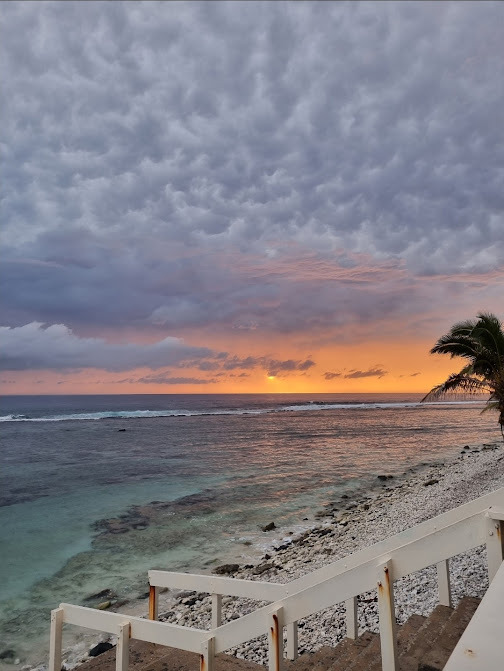
Rarotonga (from the sky, from the sea), 2022
Pinterest: yourladysteel <3
#photography#aesthetic#art#grunge#literature#yourladysteel#cottagecore#dark academia#light academia#mine#naturecore#cozycore#cozy#cottage aesthetic#island#rarotonga#pacific ocean#pasifika#island girl#moodboard#sunset#sunrise#clouds#pretty skies#pretty sky#oceancore#ocean#ocean view#sea#water
82 notes
·
View notes
Text

“There’s more beyond the reef”
November can’t come soon enough 🫨
17 notes
·
View notes
Text

Style experiment with Asian and Pasifika women <3
#my art#tina talks#flags are (top -> bottom left -> right):#south korea#japan#hawaiʻi#vanuatu#papua new guinea#phillipines#asian art#pasifika
18 notes
·
View notes
Text
I feel the word "helping" is doing a lot of heavy lifting here
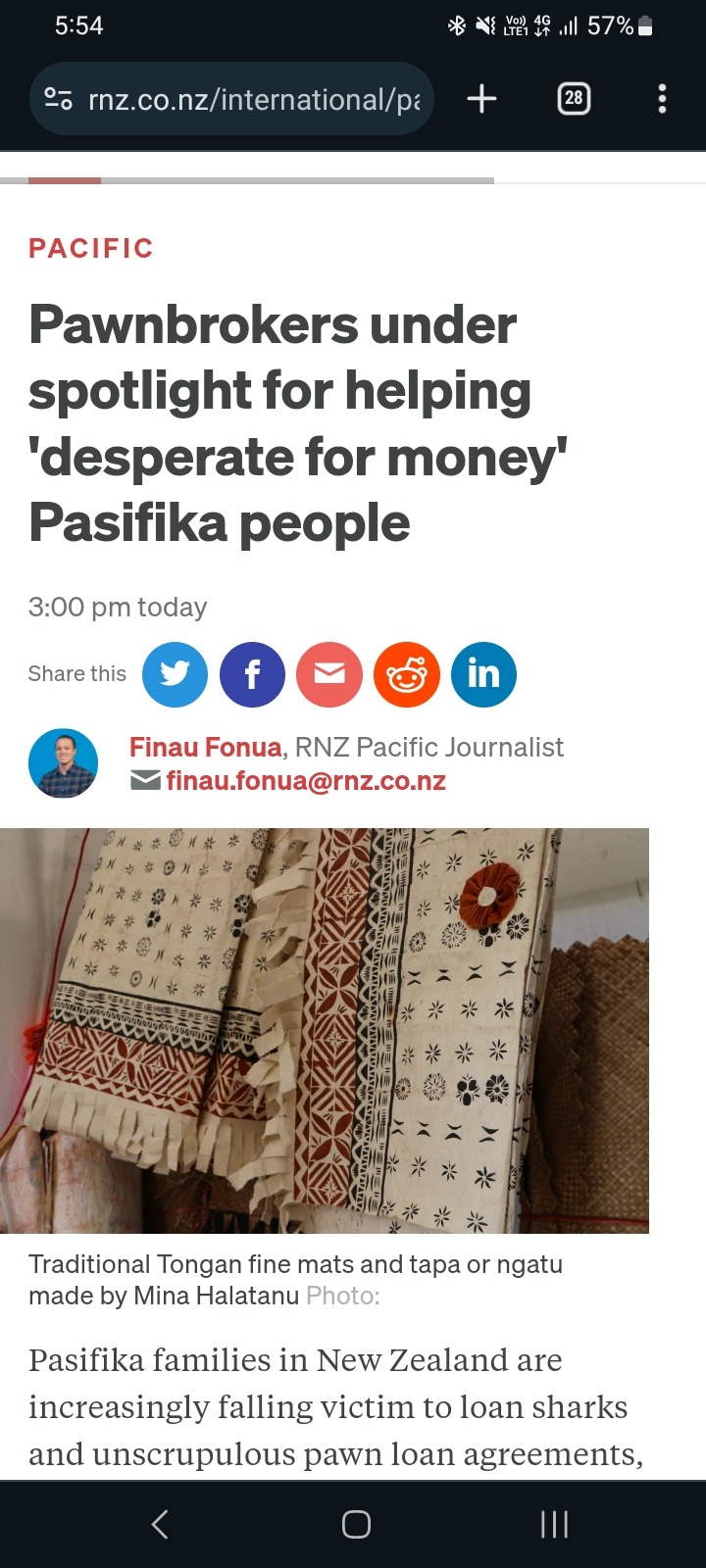
7 notes
·
View notes
Text
Here’s some positivity for Pasifika systems!
Systems all over the world are important, cherished, and welcome members of the plural community. No matter where you are, we want to listen to you, uplift you, and celebrate your stories! This post is for all the Pasifika systems out there!
Shoutout to Pasifika systems whose plurality is directly attributed to their cultural heritage and tradition!
Shoutout to Pasifika systems who formed due to, or have struggled with, anti-Asian racism!
Shoutout to Pasifika systems who are indigenous or native to Oceania!
Shoutout to Pasifika systems who struggle with inter-generational trauma due to their homeland being colonized in the past or present!
Shoutout to Pasifika systems who are immigrants, live abroad, or otherwise aren’t able to return to their cultural home!
Shoutout to Pasifika systems who are learning more about their culture and trying to embrace their heritage!
Shoutout to Pasifika systems who are leaders, activists, and otherwise fight for the rights of their people!
Shoutout to Pasifika systems who formed without trauma, whether by consciously creating their system, forming their system through spiritual means, or otherwise becoming a system without trauma playing a role!
Shoutout to Pasifika systems who struggle to find community and connections within the plural community, or the greater Pasifika/Asian community!
There is no right or wrong way to be a system, and systems come from everywhere! It’s true that the plural community tends to be white-dominated, but we see you, we care for you, and we want to lift you up and support you however we can! Being intersectionally marginalized can seem hopeless, but we want you to know that there is hope for you!
We wish you love, peace, joy, and much happiness in your future. We hope you can find meaningful connections in your lives, both inside and outside your system! Thank you so much for reading - please take care and have a wonderful day!

(Image ID:) A pale orange userbox with a cluster of multicolored flowers for the userbox image. The border and text are both dark orange, and the text reads “all plurals can interact with this post!” (End ID.)
#multiplicity#pluralgang#plurality#actuallyplural#system positivity#plural positivity#plural pride#system pride#pasifika#pasifika systems
29 notes
·
View notes
Text
Please spell people's names correctly
One of my biggest frustrations as a teacher is when people don't bother to put diacritics on peoples' names when they need them. I don't give a shit if you 'don't know how to do it on your keyboard', learn how to do it, that's someone's fucking name.
In my experience, it happens most with Pasifika and Māori names because the (usually white) teacher or school administrator didn't bother putting it on the school roll or in the school email system properly.
"But how am I supposed to learn how to pronounce all of the different letters?"
By learning and putting in the effort and not being low-key (and sometimes high-key) racist.
The linguistic dominance that English has over this country is a fucking travesty that limits peoples' ability to communicate properly with people who aren't pākehā, and that's such a shame. It's not only racist in itself, but it actively propagates and necessitates a racist point of view and way of being.
I'm white, but my name has a stràc (the thing above the 'a'), and people just blatantly ignore it in about 80% of text communication with me, emails, letters, texts etc. But because it's not an English letter, it is worth less and can be ignored; it's assumed to not have any meaning because they aren't used in English.
That's annoying, but for me, ultimately not too bad, because there isn't usually any overt ethnic discrimination towards me because of it (except for this one guy from London who was really weird about it). For other people, especially in the context of schooling, it's much more negatively impactful because of the racism that often drives the decision to ignore simple things, conscious or subconscious.
So please, for the love of god, spell peoples' names correctly.
9 notes
·
View notes
Text
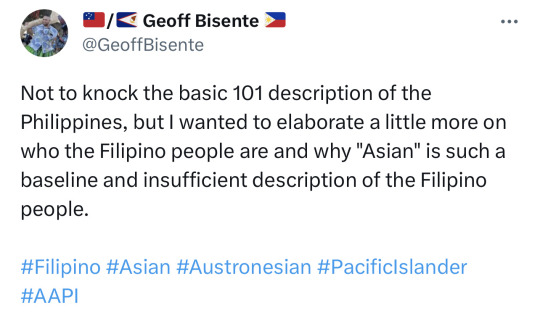
filipinos like geoff bisente who believe asian to be an “insufficient” description of the filipino people only think this because:
their idea of asia itself is biased and restrictive—they are either unaware, unappreciative, or deny the fact that the asian continent is inherently diverse. if you say the philippines is too diverse for its people to just be asian then you are inviting the question as to what being asian even means, from turkey to iran to china to sri lanka. what makes one cultural sphere more or less asian than the other? what makes asian an exclusive identity? how did east, south, and southeast asians become asian anyway?
they are preoccupied with uniqueness, hence the rejection of being “just asian” on the basis of being too diverse to be one. again, what does that mean for people living in a continent like asia? why the insinuation that other asian populations are less diverse than filipinos when, for example, indonesia itself has way more islands and people than us and yet are still asian? why is diversity the antithesis to being asian?
our austronesian heritage is overemphasized despite the fact that many, many other southeast asian populations (from southern thailand, insular and peninsular malaysia, indonesia, brunei darussalam, east timor, parts of vietnam & cambodia) and indigenous taiwanese peoples are also austronesian. these people are from a wide array of religions, ethnicities, and cultures too just like filipinos. but they are not more or less austronesian than us, let alone more or less asian.
filipinos are asian. southeast asian, maritime southeast asian, insular southeast asian. we’re not pacific islanders because we don’t come from the pasifika cultural zone. we have less in common with fijians and kanaka maoli people than we do with indigenous taiwanese and bornean peoples. whether you try to see it through a prehispanic or contemporary lens, you will find more interconnectedness between philippine populations and other southeast asians than you would with pacific islanders.
historic tattooing rituals, maritime cultures, and speaking austronesian languages are not similarities unique to filipinos and pacific islanders only but with other austronesian-speaking asians as well, even those who may not have been austronesians like the baiyue people. this also extends to other cultural features in the philippines brought about by european colonialism: this country is not the only asian country to be colonized by iberian or other european forces and to keep memories of colonialism through language, architecture, etc. so why is it us filipinos who always have to interrogate or be interrogated on our place in asia?
18 notes
·
View notes
Photo
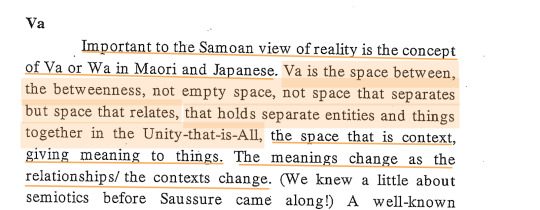
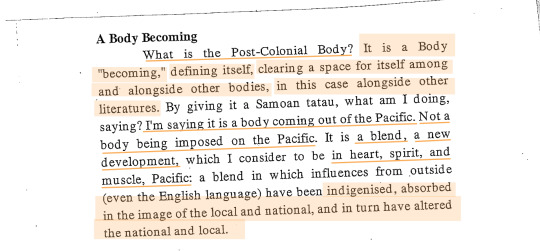
— ALBERT WENDT, ‘Tatauing the Post-Colonial Body.’
my nb immigrant ass jumped for joy reading this....
#the hau'ofa excerpt is gaining notes again#so im processing old uni readings from 2022#literature#oceania#albert wendt#.jpg#pasifika#indigenous#quote#quotes#lit
18 notes
·
View notes
Text
kia ora! i would like to suggest the coining of a term that would hopefully help a large demographic of mostly-forgotten-about māori to connect with each other and share our experiences to feel less alone, congregate around a concept regardless of country of origin and upbringing, and organise as activists.
i politely ask as many people to spread this as possible to help indigenous people organise with each other and to get the largest amount of interactions possible.
anyway, with all that being said,
i would like to coin the term "ngāti rangiātea" for māori who do not know their iwi to use.
this is based on the well known whakataukī/proverb, "i will never be lost, for i am a seed which was sown from rangiātea." i chose this whakataukī due to the spiritual significance of rangiātea as a place in māori culture, as well as to emphasise that no matter how it feels, we are not lost, we can find ourselves in each other, we can experience strength and self-realisation, and that we will exist with mana and without whakamā as rightful tangata whenua.
i've put my reasoning, personal experiences shaping my viewpoints on the matter, and various statistics under the cut to make this post reblog-friendly and i would suggest fellow māori read it regardless of whether or not they know their iwi. i also ask for the opinions of other māori, ESPECIALLY AND SPECIFICALLY other māori who do not know their iwi. in fact, i politely ask māori to share this with their whānau and people in general to share this with māori they know, especially any they know who do not know their iwi. a wide reach is what i am going for to get the largest amount of voices, critiques, and opinions on the topic and to avoid this from just becoming a very small thing that stays in an online echo-chamber.
to begin, the 2018 aotearoan census shows that, of the 775,836 people identifying as māori in aotearoa, roughly 17% are unable to identify their iwi in the census. this has gone up by 1% since 2006, showing that we are a considerably stable percentage of people. along with this, there are more than 170,000 māori living in australia and, while there are no solid statistics, there are an estimated 8,000 māori living in the UK, 3,500 in the US, 2,500 in canada, and 8,000 in other countries where there's no option for māori or any polynesians on the census.
this number adds up to 967,816 total māori and while there's no census in these countries asking for your iwi, i would go as far as to assume that there's a larger number of diaspora māori who are no longer able to identify their iwi than there are in aotearoa. of course, this is just speculation based on my lived experiences and conversations with other diaspora māori, however even assuming that it's the exact same amount globally, 17%, this is roughly 164,532 māori worldwide who do not know their iwi. nearly one in five māori do not know their iwi.
regardless of the specific statistics, the hard fact here is that there is a large percentage of māori who are unsure of their iwi for whatever reason. it's extremely easy to feel unsure of yourself, lost, disconnected, and uncomfortable speaking on issues regarding te ao māori when you're unsure of your iwi (or your hapū, whānau, waka, or anything else, but there is heavy emphasis on the iwi) and it's very easy for whakamā to take hold, especially when many māori who can recite their whakapapa aren't very polite or understanding about your situation to say the least.
and there are a lot of those people.
unfortunately, i've spoken to many māori who are of the opinion that not knowing your iwi due to colonialism, assimilation, forced disconnection, etc. means that you should not, cannot, call yourself māori. this is a disgusting viewpoint to have and in my opinion it spits on the fundamental concepts of māori culture and worldviews. thankfully this is a small yet vocal group of people, but even so, they add to the collective experience that makes it extremely difficult to navigate a world while full of whakamā and internalised racism. it can feel like there's no space for you, no term you can use, nobody you can relate to, no mana you can claim, nothing. when you cannot recite your whakapapa, it can feel like there's a part of you that's fundamentally missing.
as well as this, even when people mean well, when you are in this situation, you're usually told to just do some genealogy work, do some research, ask your family what they know. sometimes, these steps are simply not possible. other times, we've already done everything suggested over and over and over again. we're generally told "oh, that sucks, but one day you'll find out, keep looking!" in response to our lack of iwi. sure, they mean well, but i have never once been told anything along the lines of "that's okay, some things are lost to time through no fault of your own. don't beat yourself up over something your whānau had to hide to survive, what you do now to uphold your family's mana, what you do know about your whānau, and who you ultimately become is more important than what you no longer know."
and why? why is it seen as shameful to say matter-of-factly that i don't know my iwi? i'm not looking for comfort, i'm not looking to be told that, aww, there there, i'll find it eventually. i'm stating a fact. i do not need pity, i need my mana and voice to be respected.
this concept is what i want to emphasise by coining ngāti rangiātea. some things are lost to time, but we aren't. our loss of knowledge does not mean that we are unworthy of being māori, that we are unworthy of basic human respect. it does not mean that we have lost everything that our whānau knows. it is a scar, a reminder of what colonisation took from us, yes, but we cannot allow it to continue to be an open bleeding wound. we will not be lost to time and we should not bow our heads and act like we do not exist, that we're inconvenient, that we damage the "image" that māori have. in fact, we are an important aspect of māori culture and ignoring our existence does harm to everybody.
and of course we can't speak on some topics regarding te ao māori. this seems to be a topic that comes up frequently as a strawman. yes, there are some topics that would be irresponsible to speak on when we have no experience with them. this doesn't mean we can't speak on anything. having a collective identity, an "iwi" to congregate around even just politically, would help us speak on topics that we are more qualified to speak on than māori with knowledge of their iwi (yes, those topics exist, shockingly.)
we will never be lost, for we are a seed sown in rangiātea.
by identifying as ngāti rangiātea, i wish to emphasise that it's important to accept that sometimes, someone just won't be able to find every piece of information. loss of family knowledge is literally one of the primary goals of forced assimilation! we all went through it as colonised peoples, why must we continue to attach shame to those of us who were forced to obfuscate our history to keep our children alive? it's not a personal flaw, it's not a dirty secret, it's a fact of life that must not continue to be kept quiet out of shame, and the sooner we can focus on healing this subsection of our community, the stronger māori as a whole will become.
so, this is why i'd like to coin a term for māori who are unsure of their iwi. this is what i intend to achieve by giving us a name, our own "iwi" to congregate around, to identify ourselves as. instead of hanging my head and saying "i'm not sure what my iwi is, i'm sorry", instead of feeling inclined to beg like a dog to be treated with respect, i would like to look people in the eye and tell them that i am ngāti rangiātea. i would like this label to be synonymous with strength and not shame, that i refuse to let my whakamā swallow me, that i am just as worthy of calling myself māori as anyone else, that there are many others in my iwi (or lack thereof). i would like other people to have that as well and i would like those like me to feel less lost when all they've been told is "well, you'll learn your iwi eventually!" as if that's going to help someone feel better if they can't find their iwi.
and even if a person finds their iwi eventually, it's absolutely disgraceful that people are treated that they're not allowed to access many basic parts of te ao māori until they discover something they are not even 100% destined to find. i think that this view contributes to a lot of people who eventually find their iwi becoming unnecessarily arrogant towards those who truly cannot find this information, that they're just not putting enough effort in. if a person finds their iwi after identifying as ngāti rangiātea, they are fully welcome to continue to identify as this political label along with the iwi they now know they belong to as i wish for it to be a term that describes your experiences, your upbringing, and your community. you don't suddenly lose your whānau or your lived experience when you discover your whakapapa.
finally, this hopefully goes without saying, but ngāti rangiātea is not meant to function as a real existing iwi does. the term will hopefully be used as a way to identify yourself and other people and organise but i don't expect nor do i want this to be treated like a coordinated iwi. i expect and hope for this to be a decentralised way of identifying and experiencing community to make it easier to organise as a people. think of this the way the terms ngāti kangaru, ngāti rānara, ngāti tūmatauenga etc. are used.
-----
so, the tl;dr is that i feel like coining a name for a phenomenon that nearly one in five of all māori experience in quiet shame, to make it easier for us to congregate and find each other, speak on our experiences, organise as activists, feel less lost, and ultimately give us the ability to regain our mana as a community with shared goals and experiences. i have spoken to many māori who feel this way and my suggestion for this term is ngāti rangiātea, to show homage to the well known whakataukī, "i will never be lost, for i am a seed sown from rangiātea", to give us a community to work with, and to give us an "iwi" to list when asked instead of fumbling for words and feeling whakamā.
i would like to take the emphasis off of constantly looking to the future for what you may or may not even find with this identity. we are not broken, we are not lost, for we are seeds sown in ngāti rangiātea.
tēnā koutou, tēnā koutou, tēnā tatou katoa, and if you got this far, thank you for reading.
#maori#māori#pasifika#indigenous#indigenous issues#polynesia#aotearoa#aotearoa new zealand#new zealand#tangata whenua#new zealand politics#politics#i was considering calling it smth along the lines of ngāti whāngai to represent that we would be whānau from different paths and family#but ngāti rangiātea felt more succinct and meaningful. particularly with how it's very easy to feel lost when you're unsure of your iwi#please boost this even if you're not māori as i'd like as many people to see as possible <3#anyway i'm quite nervous and i hope this doesn't come across like i'm trying to be any kind of authority haha#i just feel like this is an extremely important topic that affects many people but is rarely spoken about for various reasons#ngāti rangiātea
363 notes
·
View notes
Text

Melanesian girl
Another OC I have been working on. All I knew was that I wanted her to be a Melanesian character. Name, and anything else is yet to be decided.
#art#my art#oc character#original female character#character art#digital art#digital artist#melanesian#pacific islander#oc#my oc art#my oc#pasifika#own character#character design#digital artists on tumblr#illustration#oc character art#drawing#sketch
9 notes
·
View notes
Text
Asian-American Pacific Islander Heritage Month!!
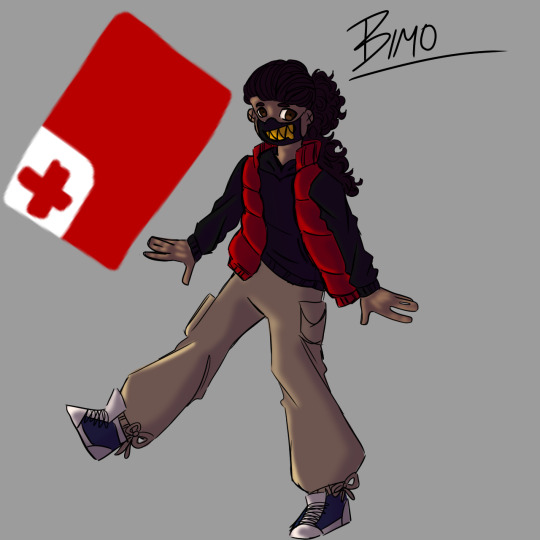
I wasn’t seeing much Pacifica Islander rep up on the internet so I’m here to give some appreciation to all my Pacific Islanders out there, with some of my Pacifika Oc’s and drawings!!

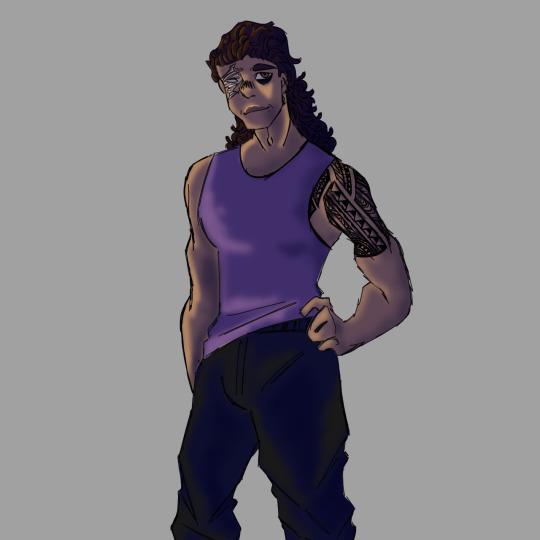

#oc#original characters#aapi#pasifika#pacific islander#oc drawing#asian american pacific islander heritage month#pacific islander heritage month#asian American heritage month#Pacific Islander Oc#Pacific Islander original character
7 notes
·
View notes
Text
QTPI ZINE!!!
Honoring inagofli’e’ & Alofa
happy to share this zine released by The United Territories of Pacific Islanders of WA and the Guma’ Gela’ CHamoru Art Collective🌺
this zine shares the findings of an indigenist collaborative research project to understand the health and cultural experiences of queer and transgender pacific islanders🌴
hopefully this finds its way to the pasifika community on here and anyone interested in learning about qtpi experiences(:
#CHamoru#chamorro#pacific islander#pasifika#gela’#queer#qtpoc#qtpi#lgbtqia#lqbtq community#micronesia
2 notes
·
View notes
Text
Miss Heilala #UrbanNesian
#tongan #tonga #ngatu #heilala #missheilala

32 notes
·
View notes